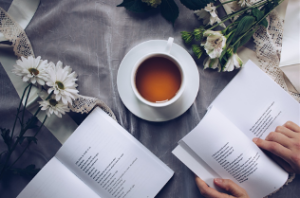
Anyone can write free verse – or so the saying goes. Free verse poems are free from limitations of meter, rhythm, or rhyme – all aspects that sometimes cause grief to creative writing students. Most of my students are happy if, for once, they are free to follow their own ideas without having to pay attention to what many perceive as the artificiality of traditional rhymed and metered poetry. However, even free verse poems are not void of artistic expression.
Free verse poetry is by no means an invention of the 20th or the 21st century. Already Walt Whitman (1819–1892) – known as the father of free verse poetry in the U.S. – understood the mesmerizing cadences of rhythm and repetition. The mother of free verse is Emily Dickinson (1830–1886), famous for her short poems, which often follow the rhythm of natural speech. The most famous 20th century representatives of free verse poetry are Ezra Pound (1885–1972), who mastered free verse combined with a musical quality, and William Carlos Williams (1883–1963). Link to blog on WCW on July 1, 2015 Although he was a champion of the free verse, Williams nevertheless wrote: “Being an art form, a verse cannot be free in the sense of having no limitations or guiding principles.”
But he was not the only one who had reservations about free verse. T.S. Eliot (1888–1965) wrote, “No verse is free for the man [and woman, one should add] who wants to do a good job.” Robert Frost (1874–1963), in a famous remark to Carl Sandburg (1878–1967), stated that writing free verse is like “playing tennis without a net.” Sandburg, in a beautifully poetic response, wrote: “There have been poets who could and did play more than one game of tennis with unseen rackets, volleying airy and fantastic balls over an insubstantial net, on a frail moonlight fabric of a court.”
Here are four very different free verse poems, written by my students in 2021, that manage to play “with unseen rackets” on a “frail moonlight fabric of a court” – using common features of free verse: alliterations, repetitions, and natural pauses.
“The City and You” by Hilal Şimşek
I’ve come to this city again,
everything is in its place
the bakery
around the corner
the barber
across the road
but we are not.
I light cigarettes, one after another
beautiful girls cross the bridge
I stare at the torn poster on the wall for a long time
It has aged here, just like me.
I haven’t missed this place,
the weather
and you.
“The Flight Tower” by Hilal Şimşek
While Hazarfen
is gliding
from the Galata
with his huge
white
wings
I hear neither
the approaching
ferry,
the waves hitting
the shore,
the shrieks
of the seagulls,
nor the iron
sharpening
the sword.
“22” by Nilüfer Küçük
Not feeling a lot different
To be honest
Not a lot changed
Just some numbers
Thank god I got some
Cool gifts
That’s the only part
I like about birthdays
“The Body” by Ciara Crehan
Red.
The blood dripping from your fingers.
White.
The color of your icy skin.
Blue.
Dead eyes staring at the ceiling.
I always told you I would win.
“The Comb” by Charlotte Filippone
The Comb
After every brushstroke
your
curly reddish hair
lace and tangle
in
the stiff teeth
of the comb
resting
on the nightstand
6,635 Total Views, 4 Views Today






